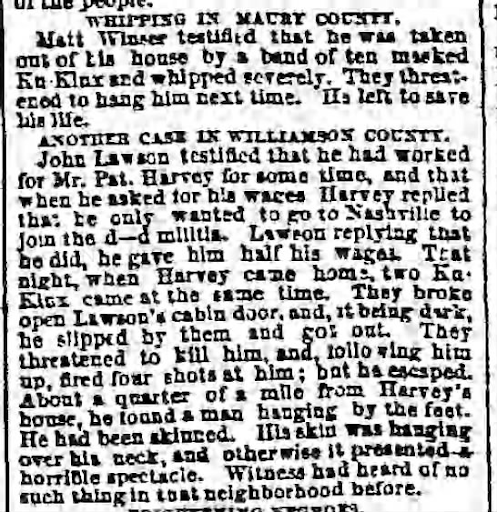The Freedmen’s Bureau was a branch of the U.S. Army sent into towns and communities in the south to help newly freed slaves transition from slavery to freedom. The Franklin Branch of the Freedmen’s Bureau had been set up in downtown Franklin on the town square by 1865. Schools and churches for the freedmen were constructed throughout the county with the help of the Bureau. They also helped navigate negotiations of labor contracts between former slaves and their white employers as well hold hearings for disputes between the two groups.
Many White men in the county distinctly felt the loss of control they had over the Black community before the Civil War. The new world that they had now found themselves in, a world where Black men were equal to them, presented many unknowns. Feelings of resentment, anger, bitterness, and confusion were prevalent and those emotions simmered. After the Riots had occurred in Franklin and with the presence of the Freedmen’s Bureau, the atmosphere was tense and relationships were strained.
The men who had lost power wanted it back. But how? How do you control a group of people that were now legally afforded the same freedoms as you? Violence. You create an atmosphere of fear. Fear is one of the best ways to control a population. So creating fear among the Black communities is what they did. Insert the Ku Klux Klan. Having already been established south of Williamson County in Pulaski, Tennessee, the KKK became a force to be reckoned with. The Franklin chapter of the KKK was founded in 1868 in downtown Franklin in the building today occupied by the Mellow Mushroom. One member remembered later in life “every respectable young White man in Williamson was in the KKK after the war.” Members of the KKK in Williamson County felt that through intimidation tactics like burning homes, beatings, and lynchings, they could create an endrun around the new statue quo.

The violence pervaded society in a very public and aggressive fashion. In 1868 an open letter to the Black public published in the Franklin Review stated “…Your safety depends upon your compliance; if you fail, it is needless to tell you that you will suffer. If you behave you will be protected, rather than molested.” This violence resulted in an almost 10% drop in the Black population of Williamson County between 1860 and 1880. Blacks moved to Northern and Western areas where they believed they would be able to build a safe future for their families. Those that couldn’t or didn’t want to leave built strong foundations for their communities all over Williamson County despite the fear. The strength and resilience this took we should all take a moment to appreciate.
Mint Juliet
1. Chicago Tribune, Chicago, IL, Monday 14 Sep 1868 (accessed newspapers.com)


